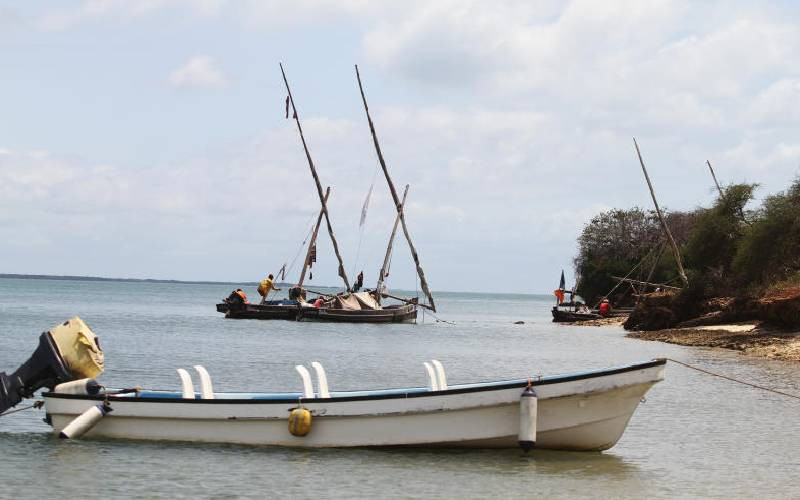
The ocean serves as a lifeline for millions of people by providing food security, supporting livelihoods, regulating climate, protecting coastlines, and sustaining cultural heritage.However, these benefits are under growing threat from climate change, overfishing, pollution, and habitat loss.
To effectively address these challenges, experts are calling for the adoption of a holistic Blue Values framework that recognises the full spectrum of marine ecosystem services—beyond just fisheries and tourism.
During a special session on Blue Values at the 13ᵗʰ Western Indian Ocean Marine Science Association (WIOMSA) Scientific Symposium, marine experts and stakeholders urged countries to adopt a comprehensive approach to managing the Indian Ocean, ensuring it continues to safeguard vital benefits for both communities and nature.
Held in Mombasa, the symposium is the region’s largest open scientific conference dedicated to advancing sustainable ocean management.
According to 2017 statistics from the World Wide Fund for Nature (WWF), the annual Gross Marine Product of the Western Indian Ocean region—comparable to a country’s Gross Domestic Product (GDP)—is at least US$20.8 billion, making it one of the largest ocean-based economies.
The region spans ten countries: Kenya, Comoros, France (Réunion and Mayotte), Madagascar, Mauritius, Mozambique, Seychelles, Somalia, South Africa, and Tanzania.
Experts at the session—co-organised by the Kenya Marine and Fisheries Research Institute (KMFRI), Kenya Forest Service (KFS), Center for International Forestry Research and World Agroforestry (CIFOR-ICRAF), the Regional Centre for Mapping of Resources for Development (RCMRD), and GRID Arendal—emphasized that sustainable ocean governance must account for ecological, social, cultural, and climate benefits, not only economic outputs.
- Report: Data-driven action key in reducing methane emissions
- How climate change is making people unhealthy
- Kenya leads Africa's voice at global environmental assembly
- Pollution highway: How Athi River transports millions of plastics into Indian Ocean
Keep Reading
James Kairo, Chief Scientist at KMFRI, stressed the broader value of the ocean:
“The ocean is more than a source of fish or tourism revenue. It is also crucial for regulating climate, protecting coastlines, sustaining biodiversity, and preserving cultural identity. These values need to be captured in national planning and policy processes to enable countries to make better decisions about investments, restoration, and governance,” he said.
James Mburu, Coast Regional Forest Conservator at KFS, highlighted the vital role of mangroves in maintaining ocean health:
“Mangroves are the frontline defenders of the Indian Ocean. They shield our coastlines from erosion, serve as nurseries for fisheries, and store vast amounts of carbon. At Kenya Forest Service, we are committed to restoring and protecting mangrove forests because their health directly determines the resilience of both our marine ecosystems and the coastal communities that depend on them.”
Together, these perspectives capture the essence of the holistic Blue Values approach: balancing economic use, environmental care, and community well-being. The framework highlights ocean benefits that cannot always be measured in monetary terms—such as biodiversity, cultural heritage, and coastal protection—while ensuring that ocean-based activities both generate income and restore ecosystems.
“This means that investments should be directed towards activities that restore and enhance ocean health, rather than just minimising harm,” explained Ivy Amugune, Research and Development Specialist at CIFOR-ICRAF.
A key aspect of the approach is using data and science-based decision-making to anticipate the long-term effects of human activities.
Josphat Nguu, Ecosystem Ecology Specialist at RCMRD, said:
“We are committed to enabling regional mapping, data, and spatial analysis so that decision-makers can see the unseen—the invisible benefits of coastal ecosystems that often go unrecognized in planning.”
Through the EU-funded Regional Centre of Excellence for Biodiversity, Forests and Seascape Ecosystems Management in Eastern and Southern Africa (RCOE-ESA), CIFOR-ICRAF and RCMRD are working with governments to expand access to credible data sources, such as the Seascapes Geoportal, to support evidence-based ocean governance.
The framework also places coastal communities at the centre of sustainable ocean management. By involving them directly in restoration, conservation, and nature-based livelihoods, the Blue Values approach helps protect food security while creating opportunities that enhance dignity and resilience.
“To sustainably manage the Indian Ocean ecosystems, it is vital to meaningfully involve communities living along the coastline who depend on these resources for their survival. Their voices, knowledge, and leadership are essential to shaping solutions that are not only effective but also just and enduring,” said Lorna Nyaga, Researcher and Community Engagement Specialist at CIFOR-ICRAF.
Conserving oceans empowers people, fosters resilience, and creates opportunities that uphold dignity for generations. Thriving marine ecosystems go hand in hand with thriving communities.
Jacklin Karimi, Policy Engagement Specialist at RCMRD, noted that embedding Blue Values into national and regional policies is critical for long-term prosperity:
“Policies must go beyond short-term gains and recognise the ocean as a foundation for long-term prosperity. By mainstreaming Blue Values into marine spatial planning, fisheries regulations, climate strategies, and coastal development policies, countries in the Western Indian Ocean can safeguard livelihoods, enhance resilience, and unlock sustainable economic opportunities,” she said.
 The Standard Group Plc is a multi-media organization with investments in media
platforms spanning newspaper print
operations, television, radio broadcasting, digital and online services. The
Standard Group is recognized as a
leading multi-media house in Kenya with a key influence in matters of national
and international interest.
The Standard Group Plc is a multi-media organization with investments in media
platforms spanning newspaper print
operations, television, radio broadcasting, digital and online services. The
Standard Group is recognized as a
leading multi-media house in Kenya with a key influence in matters of national
and international interest.











